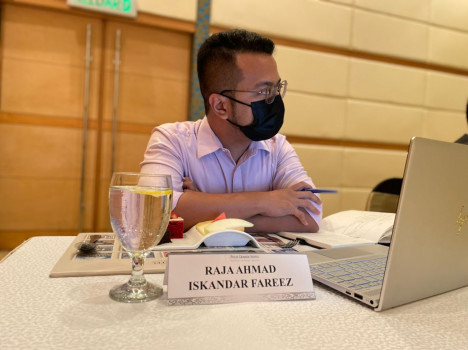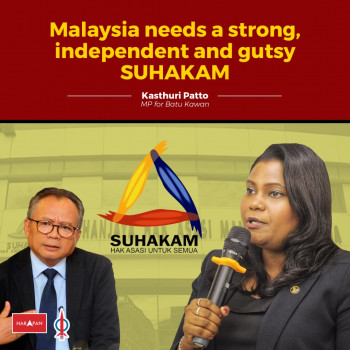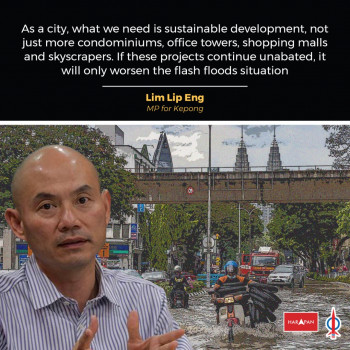By Wan Hamidi Hamid
The Democratic Action Party (DAP) was formed in 1966 with the aim of establishing a Malaysia that belongs to all its citizens regardless of race or religion, without anyone being more equal than others.
In our country, it was a radical idea then, it’s still a radical idea now. The race-based ruling elite would never allow such an idea to become a reality. It would break their dominance over the population, especially on the Malays.
Therefore, the DAP’s idea of a Malaysian Malaysia has been demonised since its inception by the UMNO-dominated Barisan Nasional and its predecessor the Alliance. Using coercion and persuasion through law and state-controlled propaganda, DAP has been labelled as chauvinist, communist and racist, merely for promoting equality, justice and fairness.
Such a situation has made it difficult for the Malays to join the DAP. In the late 1960s, when Malays preferred to be with the opposition, were more comfortable being with the Muslim party PAS or the more ideological Partai Rakyat Malaya (PRM).
The Alliance’s coercion and persuasion on racial segregation politics had made the DAP, despite its non-racial principles, attracting more non-Malays, especially the Chinese who refused to join MCA or Indians who declined MIC for toeing the UMNO line.
After the May 13 racial riot in 1969, UMNO became more dominant under a new coalition Barisan Nasional. Opposition parties such as PAS, Gerakan, People’s Progressive Party and Sarawak United People’s Party opted to join the new ruling coalition which won a landslide victory in 1974 general election.
How DAP became “Chinese”
With the implementation of the New Economic Policy – to eradicate poverty and to restructure society – many Chinese, especially the working class and the petty traders felt they were marginalised from the economic progress. They believed the NEP denied their rights as well as their children’s education, scholarship, job and business opportunity grants from the government.
When they complained to the MCA and another Chinese-majority party Gerakan leaders, they were told nothing could be done. Hence many more Chinese Malaysians flocked to the DAP asking the party to fight for their rights. Since the 1970s, the DAP became more “Chinese” in the sense that it was the party of choice for those who believed they were discriminated by the government.
This means the DAP was never a “Chinese” party to begin with. Although its membership comprised more non-Malays from the beginning, it was for an ideological reason. It was for democratic socialism – an anti-communist peaceful socialist struggle for democracy, freedom and equality; with an added Malaysian flavour of promoting equality of languages and ethnicity.
Whereas the “Chinese-ness” of the DAP since the 1970s was more of an accident of history – the NEP, the increased quota for Malays in the civil service, colleges and universities, etc – merely because the Chinese saw that the MCA and Gerakan failed to fight for their rights and their needs.
In the 1970s and 1980s, quite a number of Chinese Malaysians had to work in Singapore, Taiwan and Japan, some legally while others, illegally. They believed they were denied job opportunities in their own country.
By the 1990s, many Chinese students whose parents managed to send them overseas – many claimed good examination results but denied places in local universities – decided not to return. They were and still are earning good money overseas. Many said that they wanted to serve their country but believed that they would be downgraded at home.
Anecdotally, that’s how the DAP became “Chinese”. And to many of us, everything is now seen through the lenses of “race”.
So how it became like that?
Hegemony and assimilation
By the late 1990s UMNO began to get comfortable with the idea of Ketuanan Melayu – Malay Supremacy – something that never existed, neither in the Federal Constitution nor in the original Merdeka social contract. From then till now, the racial supremacy game has made many non-Malay Malaysians angry and upset over the unfair and discriminatory practices of the UMNO-dominated BN administration.
While some scholars saw this as a form of hegemony, others disagreed. Those who disagreed believe that hegemony must be a form of consent by the people, not just by force. To them, what has happened in Malaysia, and still happening, is an attempt of assimilation by UMNO-controlled state apparatuses on the people, especially non-Malays.
Perhaps such an argument has its merit. However in a racially segregated Malaysia, things are not always done to all the people at the same time. In a phrase, it’s always been divide and rule.
Hegemony is a term popularised by an Italian Marxist thinker, Antonio Gramsci. People thought political control is gained by domination alone, i.e. direct coercion by the state, the police, and the military. For Gramsci, such form of control would not sustain for long, therefore hegemony is important for the ruling class to maintain power.
He defined hegemony, in a collection of articles in his Prison Notebooks, as a form of ideological control, especially when it generates consent from the people who’re being ruled. It also creates a belief that the ruling class’ belief, culture and philosophy are accepted as a norm or common sense.
So instead of the control by the police and the armed forces, hegemony is about the people giving consent to the ideas of the ruling class, channelled to them by schools, church or mosque, surau or chapel, clubs, associations, groups, NGOs, etc.
French Marxist philosopher Louis Althusser elaborated hegemony further, stating that it consists of repressive state apparatus (RSA) and ideological state apparatus (ISA). Similar with Gramsci, RSA represents force and coercion, yet the ISA encompasses family, law, education, media, etc. For him, the basis of it all is ideology.
His definition of ideology is not merely as a set of beliefs or ideas but rather a “representation of the imaginary relationship of individuals to their real conditions of existence”, as quoted in his book Lenin and Philosophy and Other Essays. What he means is that once we accept an ideology, we have already set our basic identity, rightly or wrongly. And the only way to change that is to change the identity, which is very difficult.
Fear of the Other
As with Malaysia’s inherited political culture of divide and rule from the British colonial masters, the ruling class seems to focus hegemony more on the Malays than the rest of the population. It is the ideology of the ruling class. Originating from the earlier fear of the Other – from pre-Merdeka days – the ruling elite has managed to harness the sentiment into a form of belief.
(The Other here means people whom we perceive to be different from us, in terms of ethnicity, race, religion, language or/and culture. Ironically, in trying to be different from the Other, we too may become the Other to the others)
The Malays, directly and indirectly, through schools, mosques, suraus, local organisations, have been taught that their life would be ruined if the Other are allowed to lead, or even to share equal power.
Hence the hatred against the Other – although nowadays more and more Malays are fighting against such racism and bigotry – has become a staple diet in Malaysia’s politics. In fact emotionally-charged politics has been the name of the game today. Some people find it easier to blame the Other instead of trying to understand the more difficult and complex problems of the political economy, politics of class and income inequality among Malaysians.
What this mean is that the ruling class hegemony is focused mostly for the Malays. Perhaps it’s a systematic way of indoctrination, with the people giving their consent to this form of “common sense”, i.e. to racial supremacy, to religious dominance, to special “rights” (although the Constitution explicitly mentions special position).
Such a hegemony could not be imposed on the non-Malays. Perhaps the UMNO-dominated ruling elite couldn’t care less what the “minority” non-Malays thought of them.
Hence, non-Malays see that they’re not fighting against any form of hegemony but struggling against what they see as an attempt of assimilation by the UMNO-dominated state control. Therefore, some scholars, including some people in the DAP, even suggested that the only way out of this rut is to have racial equality.
It’s really not about race
The problem with this solution is that it’s also another form of hegemony; without realising it, we’re still dominated by the idea of race. Some of us even forget the reality that when poverty, or at least economic woes hit upon us, everyone will suffer, not just some ethnic groups.
It’s the problem of economic inequality, the issue of economic distribution or even redistribution. For those who dare to say it, it’s actually a problem of class; and even a problem of ideology.
British sociologist Anthony Giddens defined ideology as “shared ideas or beliefs which serve to justify the interests of dominant groups”, as quoted in his book Sociology. As it is today, both by force and by consent of the people, UMNO-dominated “ideology” is the ideology of the day, particularly among the Malays, and perhaps among some of its cronies and fellow travellers.
It’s really hegemony when racism, or even racialised views as well as racial prejudices, is the norm of today. When it is accepted as common sense, and because of it, it allows the state to maintain power and continue to have popular support, it is hegemony, or at least a form of hegemony.
Therefore DAP, while still being demonised by UMNO hegemony as a “Chinese chauvinist” party, should realise that the counter-hegemony fight must not be trapped within the realm of racial politics.
In its continuous effort to bring more Malays and East Malaysian Bumiputeras to the party, DAP must realise that it actually needs Malaysian democrats – and not ethnic Malay or Indian or Chinese or Kadazandusun or Iban or Bidayuh per se – to join the party.
When Malaysians, especially Malays, reject racial politics and institutionalised racism, only then a new politics will dawn upon us. When Malaysians, especially Chinese, reject the notion that all Malays are beneficiaries of racial politics and economic quotas, only then a new politics will dawn upon us.
DAP is neither MCA 2.0 nor MIC 2.0. It’s a social democratic party for all Malaysians who believe in a free, democratic and equal nation. If any party wants to play racial politics, it can never win against the powers that be that have institutionalised racism.
Perhaps it’s time to think and to fight outside the box, out of the realm of racial politics. No doubt it’s very difficult but it’s not impossible. -The Rocket




